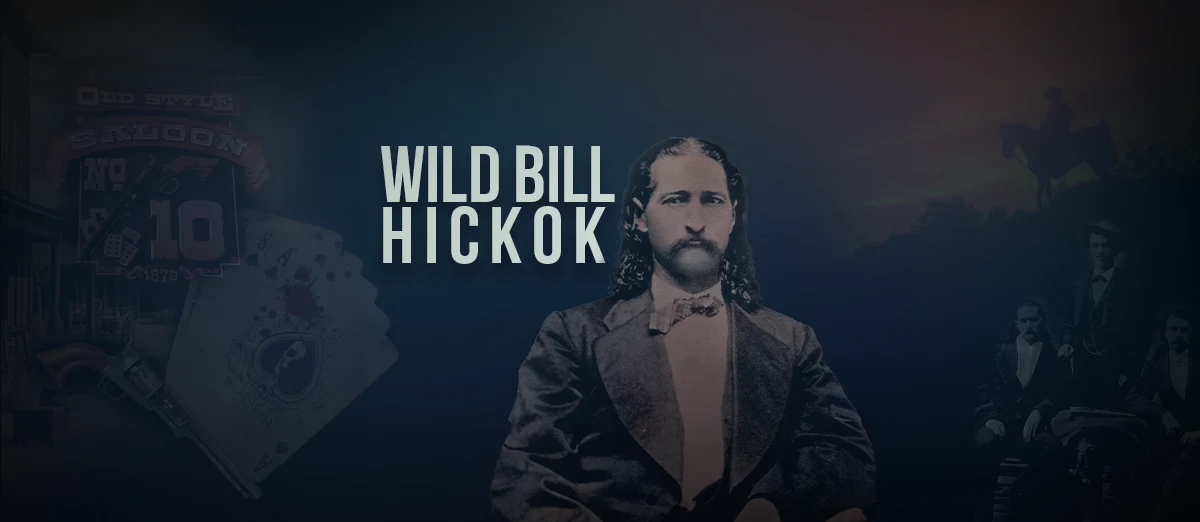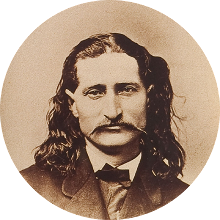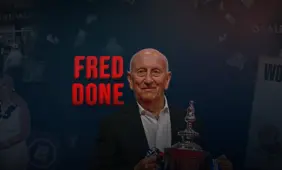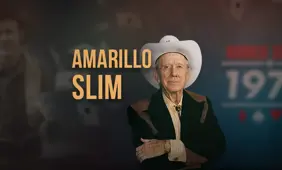Wild Bill Hickok – The Wild West Gambler Behind the Infamous Dead Man's Hand

“Wild Bill” Hickok is a legendary figure of the American Old West. He was known for his roles as a soldier, scout, lawman, cattle rustler, gunslinger, gambler, and even an actor. Hickok’s reputation grew through his involvement in famous gunfights and his knack for spinning tall tales.
- In this article
- Highlights
- Beginnings
- Career
- Wild Bill Hickok Net Worth
- Where Is He Today?
- FAQ
Many exaggerated or fabricated stories boosted his notoriety during his lifetime. Despite the controversy and myths surrounding him, Hickok's legacy as not only a very famous gambler, but a fearless lawman remains strong.
Historic sites and monuments across the U.S. honor his contributions to frontier history, and he frequently appears as a heroic figure in literature, film, and television.
While Hickok boasted about killing numerous named and unnamed gunmen, biographer Joseph G. Rosa, the foremost authority on Hickok, suggests that he likely killed only six or seven men in gunfights.
Intrigued by Wild Bill Hickok net worth and his influence on the American Wild West? This article breaks down his colorful life and lasting impact on American history.
Wild Bill Hickok Highlights

- He earned his nickname “Wild Bill” for his daring exploits during the Civil War
- Had a diverse career, serving as a soldier, scout, lawman, gambler, and actor
- He survived a bear attack that left him in bed for four months
- He was holding the “Dead Man’s Hand” when he was shot (two black aces and two black eights)
- One of the first poker players to make his living as a professional gambler
- After his death, his life has been depicted in numerous books, movies and TV shows
Upbringing and Early Life of Wild Bill Hickok
James Butler Hickok, famously known as Wild Bill, was born on May 27, 1837, in Homer, Illinois (now known as Troy Grove).
He grew up in a family rooted in strong values. Hickok’s father, William Alonzo Hickok, was a farmer and abolitionist who used their home as a station on the Underground Railroad to help escaped enslaved people find freedom.
James, the fourth of six children, was known from a young age for his red hair and exceptional marksmanship.
Wild Bill’s father passed away when he was 15 years old, and this left a significant impact on him. By 18, after a dramatic altercation with Charles Hudson, Hickok fled Illinois, mistakenly believing he had killed the man.
He found refuge in the Kansas Territory, joining Jim Lane’s Free State Army, a vigilante group fighting against slavery during the tumultuous Bleeding Kansas era.
Here, he met a young William Cody, later known as Buffalo Bill. This encounter later turned into a lifelong friendship.
Hickok’s journey through these early years shaped him into the legendary figure he would become. He quickly gained a reputation for his sharpshooting skills and bravery, setting the stage for his storied life in the Wild West. Some media at the time even speculating that Wild Bill Hickok and Doc Holliday crossed paths in the saloons of Kansas.
The Start of Wild Bill's Career
In 1857, when he was 20 years old, Wild Bill Hickock claimed a 160-acre tract in Johnson County, Kansas, near present-day Lenexa.
His bold spirit and leadership skills quickly earned him recognition. On March 22, 1958, he was elected one of the first four constables of Monticello Township, setting the stage for his legendary status in law enforcement.
By 1959, Hickok had joined the Rusell, Majors, and Waddel freight company, the parent company of the Pony Express, where his life took a dramatic turn.
While driving a freight team from Independence, Missouri, to Santa Fe, New Mexico, Hickok encountered a fierce cinnamon bear and her cubs blocking the road. In a thrilling and near-fatal encounter, Hickok shot the bear, but the bullet ricocheted off its skull, only enraging the animal.
The bear attacked, crushing him with its massive body. Despite severe injuries, Hickock managed to kill the bear by slashing its throat with a knife.
The bear left Hickok with a crushed chest, shoulder, and arm, confining him to bed for four months. After his recovery, he was sent to Rock Creek Station in the Nebraska Territory, where he worked as a stable hand.
The Infamous McCanles Shootout
One of the most infamous episodes in Wild Bill Hickok’s life occurred at Rock Creek Station on July 12, 1861, shortly after the Civil War began.
Known derisively as “Duck Bill” due to his prominent nose and upper lip, Hickok was at the center of the McCanles Massacre.
David McCanles, who had sold the station’s building to the Pony Express on credit, managed the station before being replaced. He reportedly mocked Hickok while Bill was recovering from previous injuries, which may have fueled the tensions.
The first significant account of the incident appeared in Harper’s New Monthly Magazine in February 1867. The story by Col. George Ward Nichols described Hickok arriving at Rock Creek Station to visit an old friend, Mrs. Wellman.
She warned him that McCanles and his gang were pursuing him. According to this account, McCanles stormed into the cabin, and Hickock shot him in the chest, followed by five other gang members in quick succession.
Later historians, however, present a different version. They suggest the shootout occurred inside the Rock Creek station, not the “Wellmans’s cabin. McCanles arrived with his son, cousin, and an employee to demand payment.
A shot fired from behind a curtain killed McCanles, and in the ensuing chaos, Hickok shot James Woods, who Mrs. Wellman then killed with a hoe. Hickok wounded James Gordon, who another Pony Express employee fatally shot.
Hickok and another employee were charged with murder but acquitted, claiming self-defense.

“I don't like to talk about that McCanles affair. It gives me a queer shiver whenever I think of it, and sometimes I dream about it and wake up in a cold sweat.”
Role of the Famous Gambler in the Civil War
After the Civil War began in April 1861, Hickok became a teamster for the Union Army in Sedalia, Missouri.
By the end of that year, he had risen to wagon master, but by September 1862, he had been mysteriously discharged.
Hickok then joined General James Henry Lane’s Kansas Brigade, where he reconnected with his friend Buffalo Bill Cody, who was serving as a scout.
In late 1863, Hickok worked for the provost marshal of southwest Missouri as a member of the Springfield detective police. His duties included tracking down troops drinking on duty, verifying hotel liquor licenses, and chasing down debtors to the Union Army.
In 1864, Buffalo Bill claimed to have encountered Hickok disguised as a Confederate officer in Missouri. By early 1865, due to a lack of pay, Hickok had become a scout for General John B. Sandborn.
How Did He Earn the Nickname "Wild Bill"?
Hickok earned the nickname “Wild Bill” for his daring exploits during the Civil War, serving as a spy, scout, and sharpshooter.
His adventurous spirit continued post-war, often skirting the law. On July 21, 1865, in Springfield, Missouri, Hickok killed David Tutt in a shootout over a poker game dispute.
The incident catapulted his fame as a gunslinger, especially when journalist Sir Henry Morton Stanley reported Hickok’s exaggerated claim of killing 100 men in the New York Herald.
In 1869, Hickok became sheriff of Hays City, Kansas, where he killed several men in shootouts. By 1871, he was the marshal of Abilene, Kansas, where his tenure ended after accidentally killing his deputy marshal.
Hickok then performed in Wild West shows, joining Buffalo Bill Cody’s The Scouts of the Prairie in 1873. Though it provided income, Hickok was unhappy, began drinking heavily, and returned to the West in March 1874.
The Dead Man's Hand: Wild Bill Hickok's Final Poker Hand
Hickok’s Dead Man’s Hand, the two pairs of black aces and eights, was his final hand, symbolizing bad luck and sudden death in poker lore.
The fifth card remains a mystery, often depicted as the jack of diamonds in artistic rendering.
This hand, along with the dramatic circumstances of Hickok’s death, has cemented the Dead Man’s Hand in poker mythology, serving as a cautionary tale about the perils of gambling and the unpredictable nature of life in the Old West.
Wild Bill Hickok Net Worth and Wealth
Given that he died over 150 years ago, determining Wild Bill Hickok's net worth is quite a challenge.
However, a rough estimate of his peak net worth is believed to be between $1 and $5 million in today’s money.
He amassed his wealth through various means, primarily as a law enforcement officer and later as Wild Bill Hickok the gambler.
Despite his often tumultuous financial state due to his gambling habits, his diverse careers and legendary status contributed significantly to his estimated net worth.
Where Is Wild Bill Hickok Today
Towards the end of his life, after leaving behind the gun-slinging days of a sheriff, Wild Bill Hickok ventured to the Dakota Territory.
He wasn’t just searching for gold; he was on the lookout for miners eager to gamble. During this time, Wild Bill made his living as a gambler, becoming one of the first poker pros before such a title even existed.
On August 2, 1976, he went to play stud poker at his favorite saloon in Deadwood.
Known for his caution, Wild Bill always sat with his back against the wall, but that day, he had no choice but to sit with his back to the door.
An assassin, Jack McCall, took advantage and shot him in the back of the head, ending his legendary life.
Wild Bill’s face-up cards were two pairs: black aces and black eights, now famously known as “The Dead Man’s Hand.”
FAQ
Why Did Wild Bill Hickok Get Shot?
Wild Bill Hickok’s shooter, Jack McCall, claimed he killed Hickok to avenge his brother’s death, although his claim was dubious.
Was Bill Hickok Killed Holding the Dead Man’s Hand?
The “Dead Man’s Hand” refers to the poker hand Wild Bill Hickok held when he was murdered. This hand consisted of two black aces and two black eights.
Hickok, an Old West folk hero, lawman, and gunfighter, was killed while playing poker.
How Old Was Wild Bill Hickok When He Was Shot?
Wild Bill Hickok was 39 years old when he was shot and killed on August 2, 1876, in Deadwood, South Dakota.
Why Did They Call Him Wild Bill Hickok?
Over time, Hickok developed a quick temper and aggressive demeanor, leading to the now famous nickname "Wild Bill".





Review this Blog
Leave a Comment
User Comments
comments for Wild Bill Hickok – The Wild West Gambler Behind the Infamous Dead Man's Hand